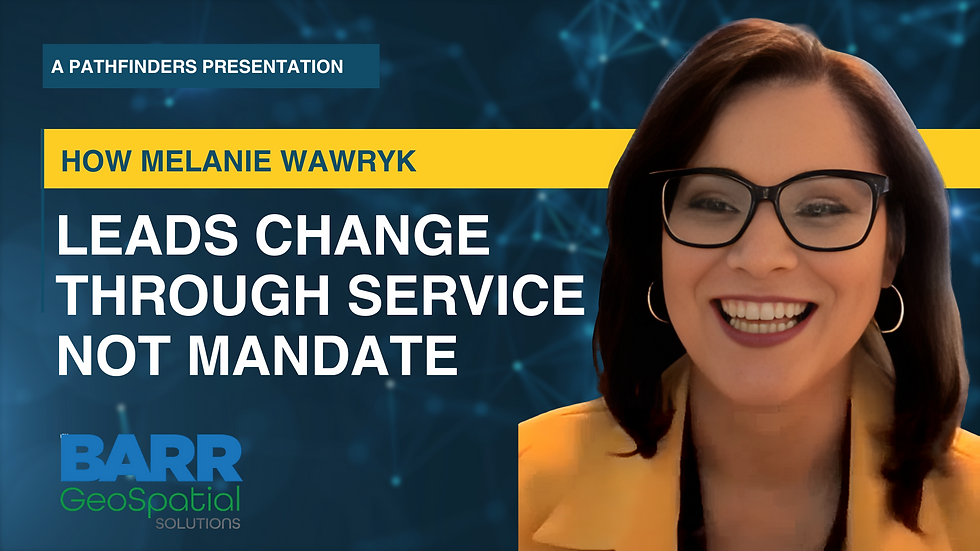How Julia Wagemann Is Changing the Map for Women in Geospatial
- Jeff Lamb

- Feb 10
- 3 min read
Updated: Aug 29
A Single Post That Sparked a Global Movement
It was March 7th, 2019—one day before International Women's Day. Julia Wagemann sat at her computer, fingers hovering over her keyboard. She'd been wrestling with mounting frustration for months, watching brilliant women disappear from the geospatial industry. The diving instructor turned Earth observation expert had travelled from a tiny 10-house village in Germany to research stations across the globe, but she'd never felt more isolated.
"Who would be interested in shaping a group for women in Earth observation and geospatial sciences?" she typed into Twitter.
What happened next changed everything.
The Hidden Exodus No One Was Talking About
Within 48 hours, over 300 women had signed up. The flood of responses revealed something Julia had suspected but couldn't prove: she wasn't alone in feeling like an outsider in her own industry.
"I realized I couldn't just complain about who else wasn't doing something," Julia reflects. "The only part I could influence was myself."
The geospatial industry was hemorrhaging talent. Brilliant minds were leaving not because they lacked skills, but because they lacked community. Women and non-binary people were excelling in university programs, then vanishing from the workforce.
Julia's background told a different story. From studying marine life on the Great Barrier Reef to analyzing satellite data in European research centres, she'd built her career by asking one simple question: "Why is this place shaped this way?" Now she was asking a harder question: "Why does our industry keep losing people?"
When Frustration Becomes Fuel
That accumulated frustration became Julia's breakthrough moment. Instead of accepting isolation as the price of pursuing her passion, she chose to build bridges.
"I had an internal feeling that in order to make a difference, I can't just complain," she says. "I became active."
The response to her tweet wasn't just overwhelming—it was revelatory. Women from 149 countries eventually joined what became Women Plus in Geospatial. Each signup represented someone who'd been waiting for permission to belong.
But growth brought new challenges. What started as an informal Slack channel needed structure. Volunteers burned out. The community risked becoming everything to everyone and nothing to anyone.
Julia faced a choice: let the movement plateau or transform it into something sustainable.
Building a Marathon, Not a Sprint
Julia and her co-founders, Olive Powell and Sabrina Szeto, made a bold decision. They transformed their grassroots initiative into a formal nonprofit organization, complete with governance structures and a strategic focus.
"We do a marathon, not a sprint," Julia explains. "Our mission will only become more relevant in the future."
The transformation wasn't smooth. Elections failed, and volunteer turnover spiked. The team learned that running a startup requires different skills from running a community chat room.
By 2024, they'd rebuilt their entire leadership team with what Julia calls "an entrepreneurial mindset." They migrated 5,500 members to a new platform. They streamlined their focus to three core pillars: Inspire (outward-facing content), Unite (community building), and Empower (professional development).
Their flagship mentorship program now has 400 applicants competing for 100 spots. Women are finding jobs through network connections, and technical experts are sharing knowledge across continents.
Your Community-Building Pathway
For changemakers reading this, Julia's story offers both a mirror and a map. Her journey reveals four practical principles for building sustainable impact:
Start with personal pain points. Julia's frustration wasn't unique—it was universal. Your biggest professional challenge might be the entry point for systemic change.
Build for the marathon. Quick wins feel good, but lasting change requires infrastructure. Julia learned that sustainable communities need governance, not just enthusiasm.
Focus ruthlessly. When everything seems important, nothing gets done. Julia's team succeeded by choosing high-impact activities over popular ones.
Expect the transformation plateau. Every growing initiative hits the point where informal structures break down. Plan for the rebuild, don't avoid it.
Consider these reflection questions:
What professional frustration keeps surfacing in your work that might signal a broader pattern?
Who else in your network might be experiencing similar challenges?
What would it look like to build sustainable infrastructure around your changemaker work?
How might you focus your efforts on activities with lasting rather than immediate impact?
Ready to explore more of Julia's Insights?
Discover her strategies for navigating the transformation from grassroots movement to structured organization, plus practical frameworks for sustainable volunteer engagement and strategic focus.
Explore the full episode or audio summary using the links provided below.
Watch Julia's full conversation with Jeff Lamb on YouTube









Comments